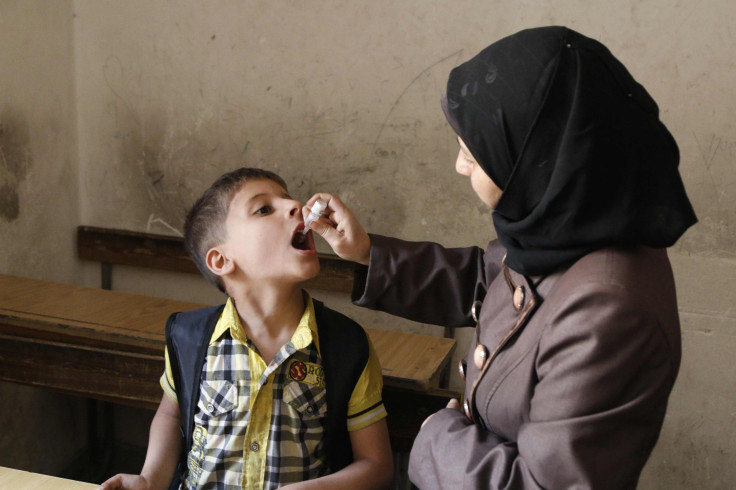Polio Spreading At High Rates, WHO Says; 60% Of Cases In 2013 Resulted From International Travel

To date, the international spread of polio in 2014 constitutes a public health risk for which a coordinated international response is essential, according to the World Health Organization (WHO). In a statement issued early Monday, the United Nations health authority stated that Pakistan, Cameroon, and Syria are currently spreading wild polio virus beyond their borders and pose the greatest risk of further exportation of polio, which primarily affects children under 5 and survives only among the world's poorest and most marginalized communities. Additionally, WHO stated that Afghanistan, Equatorial Guinea, Ethiopia, Iraq, Israel, Somalia, and particularly Nigeria, though not currently transmitting the virus beyond their own borders, pose an ongoing risk of doing so in 2014.
If unchecked, this "extraordinary situation" may result in failure to globally eradicate this vaccine-preventable disease, WHO noted in a memo. One in 200 infections with the wild poliovirus leads to irreversible paralysis, while among those paralyzed, five to 10 percent die.
Increasing evidence suggests that adult travelers are contributing to this spread of polio; in fact, over half (60 percent) of cases reported during 2013 were the result of international spread. So far, during 2014, a season of generally low transmission, health authorities have reported international spread of wild poliovirus from three of the 10 States that are currently infected — from Pakistan to Afghanistan, from Syria to Iraq, and from Cameroon to Equatorial Guinea.
The impact of the Syrian crisis continues both within and without. According to WHO, at least one million people are in need of urgent humanitarian assistance in Aleppo, which is surrounded by aggressive forces on all sides; it is reported there are only 40 doctors for a population of 2.5 million people, where once there were more than 2,000. In this fourth year of conflict, a third of the nation's water treatment plants no longer function and some 3.5 million people are living under siege. Reuters recently reported that, with more than three million Syrian refugees, exodus from the war-torn country is placing a huge strain on fragile neighboring states.
With high transmission season having already begun — traditionally, May and June are particularly ripe for poliovirus spread — WHO authorities fear that lacking a coordinated international response, international exportation will continue. WHO has acted as a partner in the Global Polio Eradication Initiative, a private-public partnership formed in 1988 when polio paralyzed more than 350,000 people a year. That initiative has successfully reduced polio by 99 percent, with international health authorities reporting only 406 polio cases in 2013, and seeks to ensure a polio-free world for future generations.
Three strains of wild poliovirus exist and none of these can survive for long periods outside the body, which is what gives health officials hope that, once enough children are vaccinated, polio will soon die out globally. Type 2 wild poliovirus was eradicated in 1999.



























